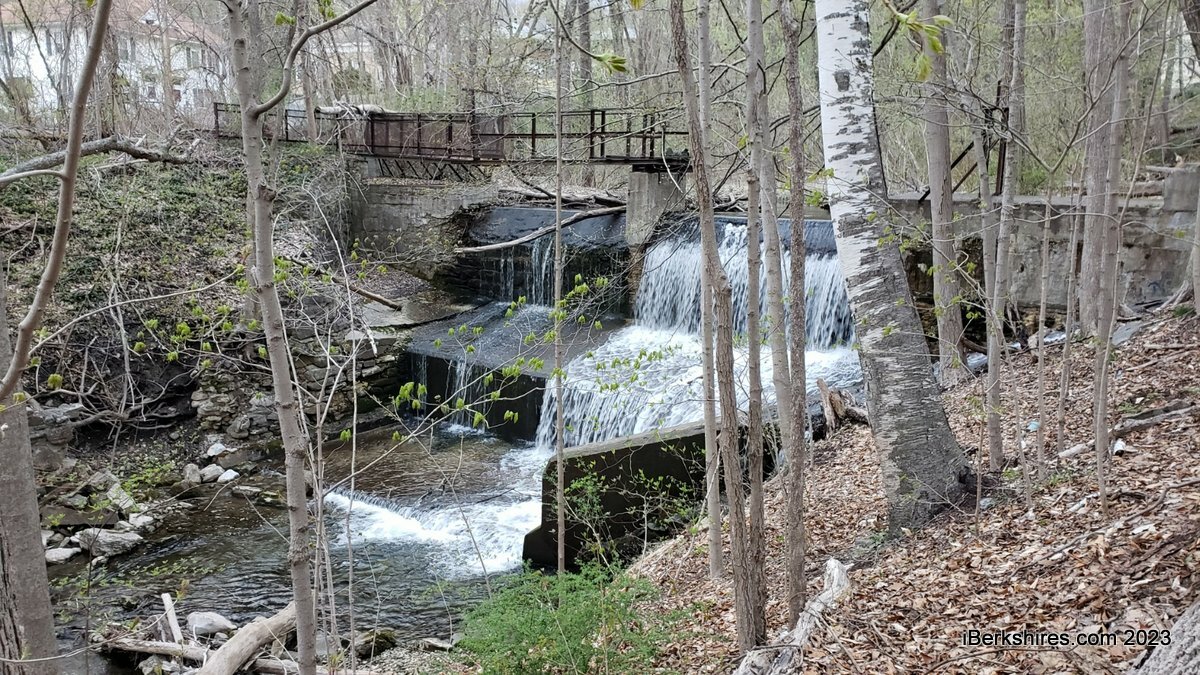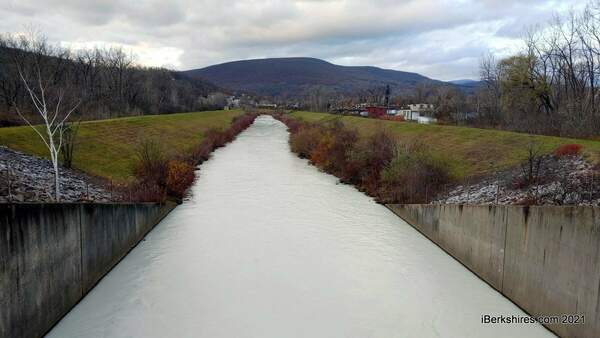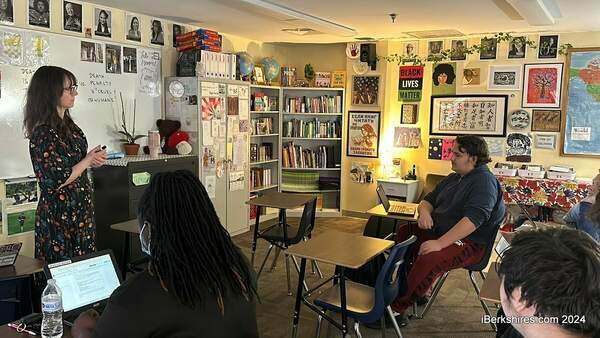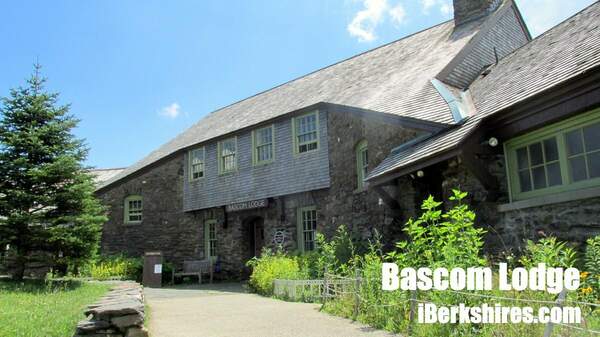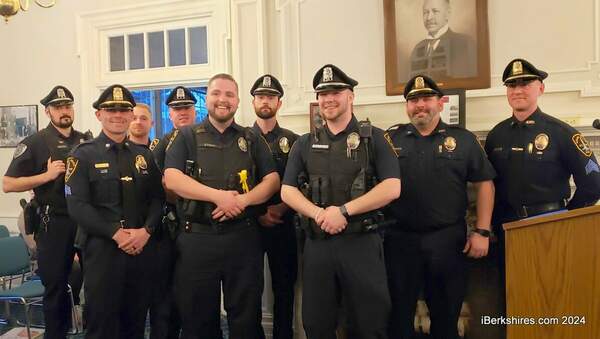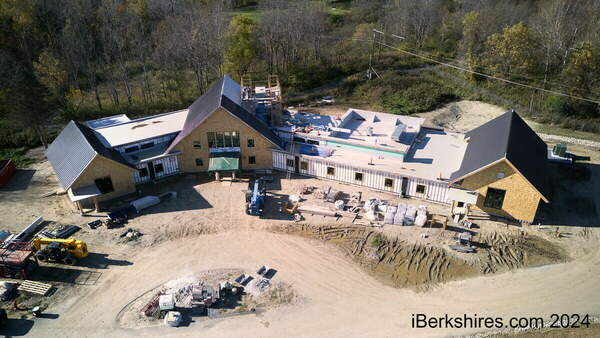Adams Planners Approve Bond, Screening for East Road Array
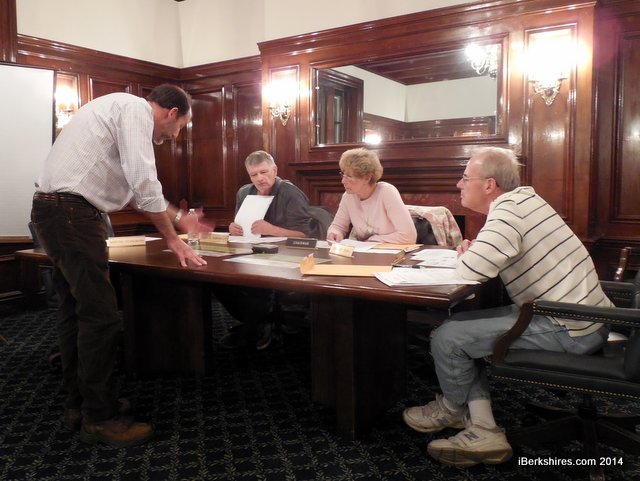 Seth Ginsberg of Apis Energy Group LLC goes over the conditions and screening plans for a solar array on East Road at Tuesday's Planning Board meeting. Seth Ginsberg of Apis Energy Group LLC goes over the conditions and screening plans for a solar array on East Road at Tuesday's Planning Board meeting. |
ADAMS, Mass. — The Planning Board has approved financial surety and planting buffers for the controversial East Road private solar array despite continued questions of its legality by abutters.
Planners met on Tuesday with Seth Ginsberg of Apis Energy Group LLC, developer of the 1.5-megawatt array, to discuss conditions put on the project by the Zoning Board of Appeals, as outlined by the Community Development Office.
The board accepted a performance bond of $100,000, which will be released upon the completion and approval of the solar array. It also approved a surety of $30,000 for the removal of the solar array in the future.
Ziemba asked if the $30,000 would cover the disposal of the panels in 25 years.
"At basic bank growth rate, $30,000 would be more than enough," Ginsberg said. "They are recycled. There are business who would be happy to take them for nothing because they usually have to pay for them."
Building Commissioner Don Fitzgerald said he was happy with the amount.
"It is recyclable stuff that actually has value so I don't think the town gets hurt at the end of the life cycle," he said. "This is good coverage for the town and what they are leaving in for the surety bond to guarantee completion of the project is a little bit more than adequate."
Ginsberg said a greenbelt will be installed along the western edge of the property to screen the project from residents. The various trees that will be planted will grow from 40 to 70 feet high and provide year-round coverage.
Some residents opposing the project's placement on privately owned property at 217 East Road attended the meeting.
Edward Driscoll, a former selectman and East Road resident, asked how the project could move forward when the plan was approved at what he said was an illegally posted meeting.
The site plan initially met resistance from the Planning Board in 2013 when it unanimously disapproved the installation of the 6,500-panel, ground-mounted solar array.
The board felt the development would negatively affect the surrounding residents and environment. Planners also feared that drainage would be an issue and interpreted state law on the subject as not allowing a by-right installation of a large ground-mounted system in a residential area. Rather, the board described the array as an industrial/commercial structure.
The site plan then went to the Zoning Board of Appeals where the Planning Board's decision was ultimately — and somewhat confusingly — reversed.
A collective of nearly 20 residents who live near the site took legal action against the developer and the town of Adams because they felt the appeals board acted beyond its purview and the decision was made unfairly.
In a letter to the planners, Driscoll said the abutters had dropped their suit after being "intimidated" by a potential legal cost of $50,000 to $80,000. They had agreed to a settlement requiring they not speak of the agreement; Driscoll, however, did not.
 East Road resident Edward Driscoll urged the board to table the conditions and hire a lawyer, claiming the ZBA's vote to approve the site plan was done in violation of Open Meeting. East Road resident Edward Driscoll urged the board to table the conditions and hire a lawyer, claiming the ZBA's vote to approve the site plan was done in violation of Open Meeting. |
Driscoll asked the planners to table their decision and seek funds for an expert lawyer to help with the issue.
"I don't wish to participate in the meeting because I believe it validates an illegal meeting so I am going to take off," Driscoll said. "My only suggestion would to be to, prevent litigation, table it and ... ask the selectmen to transfer funds for an expert lawyer like they have done in the past."
He referred to a Nov. 19, 2013, meeting at which town counsel advised that the ZBA's initial vote of 3-2 against upholding the Planning Board's rejection of a building permit would stand. Since it did, the ZBA then voted 4-1 to approve the site plan.
Driscoll claims there was an opening meeting violation because it was believed the continuance on Nov. 19 was only to determine the result of the building permit vote, not for the site plan, and that abutters were not informed there would be a decision on the site plan. However, the agenda for the Nov. 19 meeting refers to an appeal of "the Planning Board's denial of the Applicant's site plan approval application which resulted in the denial of the building permit." The wording of the agendas is similar for all three meetings held by the ZBA on the issue.
Chairwomen Barbara Ziemba said the board cannot take up legal action because it is not on the agenda, and there is nothing they can do as a board.
"The Zoning Board technically approved the site plan, and that's where it stands. We have to go along with it whether we approve of that decision or not," Ziemba said. "Our hands are tied."
Driscoll thanked the board for listening and left the meeting along with the other residents.
Tags: Planning Board, site plan review, solar array, ZBA,

